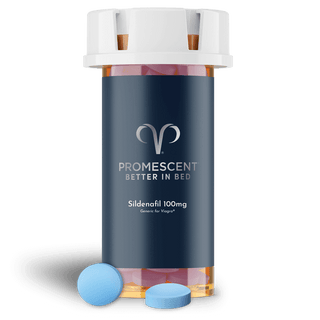Erectile tissue damage is an issue that can be often be overlooked when it comes to male health. Find out what the signs and causes are and how to treat it.

20 reviews


2,900 reviews

Erectile tissue damage, if left untreated, can have profound impacts on sexual health and overall well-being.
This condition, marked by symptoms that range from pain during erections to difficulties in achieving or maintaining an erection, warrants attention and understanding.
Some of the signs of erectile tissue damage include pain, discomfort, difficulty achieving erections, and penile swelling.
Damage to the erectile tissue is can be caused by penile fractures, cardiovascular issues, neurological conditions, and other health issues.
It's important to consult with a physician for treatment options. Different treatments that may be recommended include cold compresses, ED medication, or in extreme cases, surgical intervention.
Our article will dive into the key signs that indicate damage to the erectile tissue, offering insights into the causes, implications, and the importance of seeking medical advice for diagnosis and treatment.
As we navigate through these indicators, we’ll go over the importance of early detection and the available treatment options to restore sexual function and health.
Recognizing the signs of erectile tissue damage is pivotal in maintaining sexual health and overall well-being. Here are some of the symptoms to look out for.
Erectile tissue damage can occur due to physical causes, lifestyle factors, and age-related changes. Knowing the specific cause is the first step to getting treatment.
Erectile tissue damage often stems from a variety of physical conditions, including but not limited to:
Lifestyle choices also play a significant role in erectile health. Factors such as smoking, excessive alcohol consumption, a sedentary lifestyle, and poor diet can increase the risk of erectile dysfunction by affecting cardiovascular health and overall wellness.
While aging itself is not a direct cause of erectile tissue damage, the prevalence of conditions that contribute to it, such as cardiovascular disease and diabetes, increases with age.
Older individuals are more likely to experience symptoms associated with erectile dysfunction due to the accumulation of risk factors over time.
Through lifestyle modifications, medical intervention, and psychological support, individuals can significantly reduce their risk of erectile tissue damage and improve their sexual health and overall quality of life.
In the quest to maintain optimal sexual health, understanding the diagnostic approaches for identifying signs of erectile tissue damage is paramount.
This section delves into the methods healthcare professionals use to diagnose and assess the condition, ensuring that individuals receive the most effective and tailored care.
The journey to diagnosis often begins with a comprehensive review of one’s medical history and a physical examination.
A medical history involves discussing symptoms, sexual health history, and any underlying conditions that might contribute to erectile tissue damage.
It's a moment for individuals to be open and honest with their healthcare provider about their health and lifestyle.
A targeted physical exam can reveal visible signs of erectile tissue damage or related conditions.
This may include examining the penis for any noticeable changes in shape, color, or the presence of scar tissue.
To further understand the extent of erectile tissue damage, healthcare providers may employ several advanced diagnostic tools:
Being open and honest with your healthcare provider about your symptoms and medical history is crucial.
A combination of a medical history review, physical examination, and advanced diagnostic tests ensures a thorough assessment.
The results of these diagnostics guide healthcare professionals in creating a personalized treatment plan to address the specific causes and extent of erectile tissue damage.
In addressing erectile tissue damage, the pathway to recovery may involve a combination of immediate care, long-term rehabilitation strategies, and in some cases, surgical interventions.
These treatment options can help restore erectile function and ensure a return to a satisfying sexual life.
Immediate care is crucial for acute injuries to prevent long-term damage. This often involves:
Long-term strategies focus on addressing the underlying causes of erectile dysfunction (ED) and restoring function. A few options a healthcare provider may recommend include:
Lifestyle modifications may also be recommended. Engaging in regular cardiovascular exercise, maintaining a healthy diet, quitting smoking, and reducing alcohol intake can significantly improve erectile function over time.
In cases where non-surgical treatments are ineffective, surgical options may be considered, such as penile implants or vascular surgery.
Penile implants involve surgical insertion of devices that can be manually controlled to inflate or deflate, simulating the natural process of erection and flaccidity.
Vascular surgery involves blood vessels being managed by medical therapy, such as surgical reconstruction or invasive catheter.
It may help improve blood flow to the penis in cases where blood flow is restricted due to injury or atherosclerosis.
Maintaining erectile health is a cornerstone of a man's overall well-being and quality of life.
It's not only about preventing erectile tissue damage but also about fostering a lifestyle that supports vascular and nerve health essential for optimal sexual function.
Here are a few ways to proactively protect and maintain erectile health:
Implementing these strategies not only supports erectile health but also contributes to overall physical and mental well-being. It’s important to remember that prevention is always better than a cure.
Taking time to focus on erectile health is crucial for maintaining not just sexual well-being but overall quality of life.
Understanding the signs of erectile tissue damage and knowing when to seek help can empower individuals to take proactive steps towards recovery and wellness.
Be sure to consult with a healthcare provider for accurate diagnosis and treatment. Having regular check-ups can help with avoiding future issues.
By adopting a proactive approach to health and making informed lifestyle choices, maintaining erectile health can be a manageable and integral part of a healthy lifestyle.
فريقنا لديه بأكثر من عشر سنوات من الخبرة في مجال الصحة الجنسية وهم خبراء في الاضطرابات الجنسية، مثل سرعة القذف. نحن نساعد الأزواج والأفراد على فهم أفضل لخيارات العلاج المتاحة لأنواع مختلفة من الاحتياجات الجنسية وتثقيف الجمهور بشأن كل الأشياء المتعلقة بالعلاقة الحميمة. نراجع كل المحتوى المكتوب لدينا طبيًّا للتأكد من دقته وموثوقيته.
Absorption Pharmaceuticals LLC (Promescent) has strict informational citing guidelines and relies on peer-reviewed studies, academic or research institutions, medical associations, and medical experts. We attempt to use primary sources and refrain from using tertiary references and only citing trustworthy sources. Each article is reviewed, written, and updated by Medical Professionals or authoritative Experts in a specific, related field of practice. You can find out more about how we ensure our content is accurate and current by reading our editorial policy.
"Penile Curvature (Peyronie's Disease) - NIH." Niddk.nih.gov, 2019, https://www.niddk.nih.gov/health-information/urologic-diseases/penile-curvature-peyronies-disease. Accessed on Feb, 14, 2024.
Gonca S, Yazir Y, Göçmez SS, Dalçik EN, Utkan T, Dalçik H. Chronic moderate alcohol consumption induces iNOS expression in the penis: An immunohistochemical study. Turk J Med Sci. 2014;44(3):375-80. doi: 10.3906/sag-1303-102. PMID: 25558636. Accessed on Feb, 14, 2024.
"Sex, Age, Cardiovascular Risk Factors, and Coronary Heart Disease - American Heart Association." Ahajournals.org, 1999, https://www.ahajournals.org/doi/10.1161/01.CIR.99.9.1165. Accessed on Feb, 14, 2024.
Fernandes MAV, de Souza LRMF, Cartafina LP. Ultrasound evaluation of the penis. Radiol Bras. 2018;51(4):257-261. doi:10.1590/0100-3984.2016.0152. Accessed on Feb, 14, 2024.
"What is the nocturnal penile tumescence (NPT) test? - ISSM." Issm.info, 2024, https://www.issm.info/sexual-health-qa/what-is-the-nocturnal-penile-tumescence-npt-test. Accessed on Feb, 14, 2024.
"Vascular Surgery - Yale Medicine." Yalemedicine.org, 2024, https://www.yalemedicine.org/conditions/vascular-surgery. Accessed on Feb, 14, 2024.

Generic Viagra®
20 reviews
Save up to 92% when you choose the generic version of Viagra® or Cialis® versus brand-name pills.
Save up to 92%
2,900 reviews
Your Cart Is Empty

$19.95

$14.95

$19.95